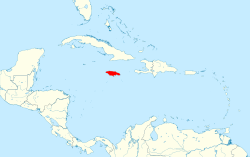| Gould's emerald | |
|---|---|
 | |
| Scientific classification | |
| Kingdom: | Animalia |
| Phylum: | Chordata |
| Class: | Aves |
| Clade: | Strisores |
| Order: | Apodiformes |
| Family: | Trochilidae |
| Genus: | Riccordia |
| Species: | †R. elegans |
| Binomial name | |
| †Riccordia elegans Gould, 1860 | |
 | |
| Synonyms | |
| |
Gould's emerald (Riccordia elegans) or the Caribbean emerald is an extinct species of hummingbird in the family Trochilidae. It was described based on a single specimen taken in 1860; it is of unknown origin, but the northern Bahamas or especially Jamaica are likely sources.
In 2023 the International Ornithological Committee deleted it from its species list "until, and if, genetic analysis and/or stable isotope analysis sheds further light on its status." [2]
